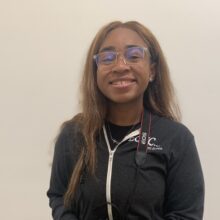Share this story
The first UNC System-wide effort to bring college students back to the classroom has yieled significant results.
Project Kitty Hawk is a nonprofit education tech company that is partnering with UNC System institutions to provide online degree programs specifically for adult learners. Project Kitty Hawk contacts former students who started a degree at one of the system’s colleges or universities but never finished. Counselors then walk students through options of when and how they can resume their studies and find them the institution that fits their needs.
The UNC System is now seeing success in engaging students and getting their return on investment. Since May 2023, nearly 1,800 students have gone back to school, according to a press release from the system.
Miyaka Mackie, a junior at the University of North Carolina at Pembroke, is one of the returning students. She has been balancing her education with a career and raising four children. She returned to UNC Pembroke in January through the Project Kitty Hawk Re-Enrollment Program and expects to graduate in 2025.
“For me, working full time and raising kids, taking online classes is the only way I could do it,” Mackie said. “It gives me the flexibility to do my schoolwork after work or late at night. That’s key for me.”
The program is free of charge to UNC System institutions. To participate, institutions provide a list of students who stopped attending college before earning their degrees. The list includes recent students and those who have been out of school for over 10 years.
These former students then receive phone calls, emails, or text messages from counselors at ReUp Education– Project Kitty Hawk’s partner in the re-enrollment program. Students are contacted individuals via text, call, or email to explain their options if they want to resume their studies. Returning students do not have to finish their studies at their previous school.
Since the program’s inception, 10 UNC System colleges and universities have signed up to participate. UNC Pembroke has re-enrolled the most students, standing at 362 individuals. Western Carolina University and UNC Greensboro follow close behind at 356 and 303 students, respectively.
Dr. Robin Cummings, chancellor of UNC Pembroke, said the program has helped them support and engage students.
“Whether they are simply re-enrolling to finish what they started or seeking new opportunities in life, it is incredibly rewarding to see the project’s positive impact for so many individuals. As a school of access, UNCP is appreciative for the work this collaboration has initiated to remove barriers and ensure North Carolinians have every opportunity to pursue higher education,” Cummings said.
Collectively, the 10 participating institutions have acquired over $3 million in additional revenue through student tuition since participating in the program. This figure does not include things such as fees, room and board, and other costs associated with returning to school.
The cost of education is a common concern. An independent study done on the entire UNC System earlier this year found that most students got a positive return on investment from their degree. Return on investment is calculated by comparing the lifetime earnings of UNC System graduates to those without a degree. Graduate programs were analyzed by comparing earnings for those with a bachelor’s degree alone.
The report’s dashboard is meant to answer common questions, such as whether people will earn more in their lifetime by working four years after high school or attending college.
More than half of students who re-enroll through the Project Kitty Hawk program have been out of school at least three years — a hard demographic to engage, the press release said.
“The PKH Re-Enrollment Program has returned hundreds of students to UNCG over the past year — and many of these students would have never re-engaged with our university,” Franklin D. Gilliam, Jr., chancellor of UNC Greensboro, said.“Bringing these students back into our university is not only a benefit to UNCG, but also to the communities in which these students live.”





